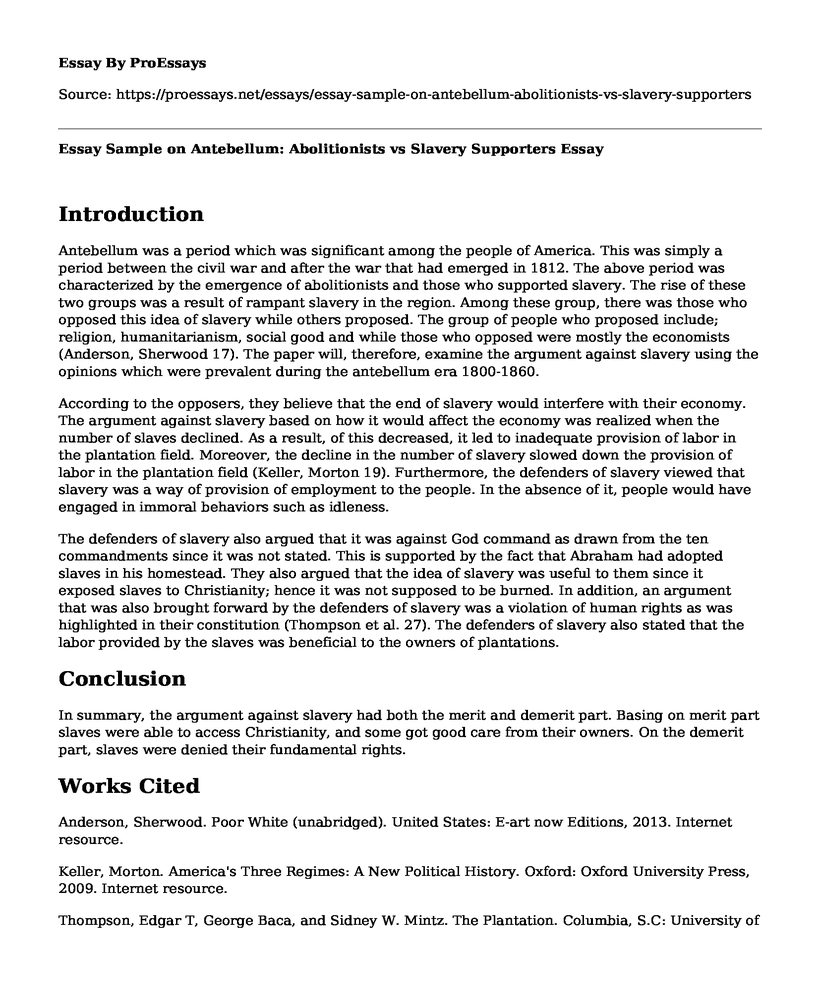Introduction
Antebellum was a period which was significant among the people of America. This was simply a period between the civil war and after the war that had emerged in 1812. The above period was characterized by the emergence of abolitionists and those who supported slavery. The rise of these two groups was a result of rampant slavery in the region. Among these group, there was those who opposed this idea of slavery while others proposed. The group of people who proposed include; religion, humanitarianism, social good and while those who opposed were mostly the economists (Anderson, Sherwood 17). The paper will, therefore, examine the argument against slavery using the opinions which were prevalent during the antebellum era 1800-1860.
According to the opposers, they believe that the end of slavery would interfere with their economy. The argument against slavery based on how it would affect the economy was realized when the number of slaves declined. As a result, of this decreased, it led to inadequate provision of labor in the plantation field. Moreover, the decline in the number of slavery slowed down the provision of labor in the plantation field (Keller, Morton 19). Furthermore, the defenders of slavery viewed that slavery was a way of provision of employment to the people. In the absence of it, people would have engaged in immoral behaviors such as idleness.
The defenders of slavery also argued that it was against God command as drawn from the ten commandments since it was not stated. This is supported by the fact that Abraham had adopted slaves in his homestead. They also argued that the idea of slavery was useful to them since it exposed slaves to Christianity; hence it was not supposed to be burned. In addition, an argument that was also brought forward by the defenders of slavery was a violation of human rights as was highlighted in their constitution (Thompson et al. 27). The defenders of slavery also stated that the labor provided by the slaves was beneficial to the owners of plantations.
Conclusion
In summary, the argument against slavery had both the merit and demerit part. Basing on merit part slaves were able to access Christianity, and some got good care from their owners. On the demerit part, slaves were denied their fundamental rights.
Works Cited
Anderson, Sherwood. Poor White (unabridged). United States: E-art now Editions, 2013. Internet resource.
Keller, Morton. America's Three Regimes: A New Political History. Oxford: Oxford University Press, 2009. Internet resource.
Thompson, Edgar T, George Baca, and Sidney W. Mintz. The Plantation. Columbia, S.C: University of South Carolina Press, 2010. Internet resource.
Cite this page
Essay Sample on Antebellum: Abolitionists vs Slavery Supporters. (2023, Jan 09). Retrieved from https://proessays.net/essays/essay-sample-on-antebellum-abolitionists-vs-slavery-supporters
If you are the original author of this essay and no longer wish to have it published on the ProEssays website, please click below to request its removal:
- The Depression and the American Culture Essay
- Slave Abolition During the Era of Civil War Paper Example
- Political Changes Preceding World War 1 Essay Example
- Clausewitz on War and Politics Essay Example
- Essay Example on Frederic Chopin: The Prodigy Pianist and Composer
- Essay Sample on Antebellum: Abolitionists vs Slavery Supporters
- Essay Example on Artist Sam Gilliam's Mental Health Fight: A Case Study







